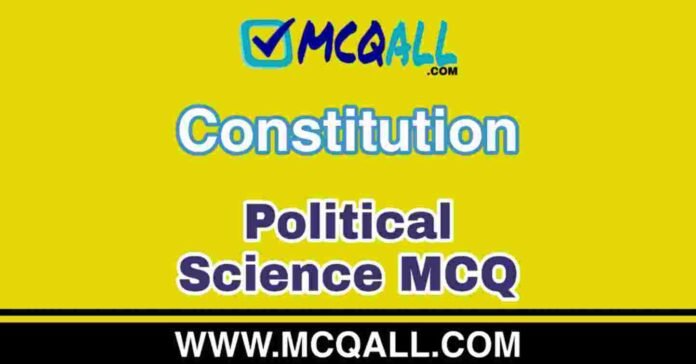Constitution – Political Science MCQ Question and Answer
Constitution – Political Science MCQ Question and Answer : Constitution – Political Science MCQ Question and Answer is given below. This Constitution – Political Science MCQ / Constitution – Political Science Quiz / Constitution – Political Science Question and Answer / Constitution – Political Science Multiple Choice Question, Short Question, Question and Answer, Suggestion, Notes are very important for school, college and various competitive or job exams and interviews.
Those of you who are looking for Constitution – Political Science MCQ Question and Answer, can read the questions and answers given below.
Constitution – Political Science MCQ
- Prohibition and abolishment of untouchability be achieved by –
- 1. Making laws
- 2. Improving Education
- 3. Public Awareness
- 4. Providing Jobs/Services
(A) 1, 2 and 3
(B) 2, 3 and 4
(C) 1 and 2
(D) 2 and 4
Answer : A
Solution: Untouchability may be abolished by improving the education system, making laws, and increasing public awareness but providing jobs/services to people is not a proper solution to abolish untouchability.
- According to the Constitution of India, which of the following are fundamental to the governance of the country ?
(A) Fundamental Rights
(B) Fundamental Duties
(C) Directive Principles of State Policy
(D) Fundamental Rights and Fundamental Duties
Answer : C
Solution: Article 37 of the Constitution says that the Directive Principles are not enforceable in any Courts of Law in India, but are fundamental in the governance of the country. It will be the duty of the State to ensure that these principles are applied in the legislation of laws.
- Which of the following is the ideal custodian of the Constitution of India ?
(A) The President of India
(B) The Prime Minister of India
(C) The Lok Sabha Secretariat
(D) The Supreme Court of India
Answer : D
Solution: The Supreme Court of India is the ideal custodian or the Guardian of the Constitution of India. The Constitution of India is the Supreme Law of India. It is a living document. It lays down the framework defining fundamental political principles, establishes the structure, procedure, powers and duties of the Government institutions and sets out Fundamental Rights, Directive Principles and the Duties of Citizens.
- The tenure of Central Information Commissioner is —
(A) 6 years
(B) 2 years
(C) 4 years
(D) 5 years
Answer : D
Solution: Section 13 of the RTI Act 2005 provides that the Chief Information Commissioner shall hold office for a term of five years from the date on which he enters upon his office and shall not be eligible for reappointment.
- Which of the following statements is not correct?
(A) To hold the office of President Candidate should have the minimum age of 35 years
(B) Vice-President is Chairman of Rajya Sabha
(C) Vice President is elected by the President of India
(D) First President of India was Dr. Rajendra Prasad
Answer : C
Solution: According to Article 66, the Vice-President is elected by the members of Parliament by the Proportional Representation System and Single Transferable Vote System. All the other three statements are true.
- The distribution of power between Centre and States as in the Constitution of India is based on which of the
following plans?
(A) Morely-Minto Reform, 1909
(B) Montagu-Chelmsford Reform, 1919
(C) Government of India Act, 1935
(D) Indian Independence Act, 1947
Answer : C
Solution: The separation of power was made by the Government of India Act, 1935. It divided the legislative powers between central and provincial legislatures and replaced ‘dyarchy in provinces with dyarchy at the center’. The act also envisaged establishment of Federation of India made up of both British India and some of Princely States. However, this part was never implemented.
- Which of the following characteristics is common between the Federal system of India and America?
(A) A single Citizenship
(B) Three lists in the Constitution
(C) Dual Judicial System
(D) A Federal Supreme Court for Interpretation of the Constitution
Answer : D
Solution: The characteristic of “Federal Court for Interpretation of Constitution is common in both Indian and American federal systems. While in the United States there is one Judicial system at the Union level and other at the State level. There is absence of three list in the constitution of USA. The Indian Constitution provides single citizenship, where as, U.S. Constitution provides dual citizenship.
- By which name/names is our country mentioned in the Constitution?
(A) Bharat and India
(B) Bharat only
(C) Hindustan and India
(D) Bharat, Hindustan and India
Answer : A
Solution: There was no unanimity in the Constituent Assembly about the name of the country. Some member suggested the traditional name Bharat while others advocated the modern name India. Hence the Constitution of India contains both. According to Article 1- “India, that is Bharat, shall be a Union of States.
- According to Article 1 of Indian Constitution, India is –
(A) Group of States
(B) Federation of States
(C) Confederation of States
(D) The Union of States
Answer : D
Solution: According to Article 1 of the Indian Constitution, India, that is Bharat shall be a Union of States. The territory of India shall comprise (1) States (2) Union Territories (3) such other territories as may be acquired. The name and territories of the States has been specified in the First Schedule.
- Which of the following is given the power to enforce the Fundamental Rights by the Constitution?
(A) All Courts in India
(B) The Parliament
(C) The President
(D) The Supreme Court and High Courts
Answer : C
Solution: Article 13 of the Constitution grants power of Judicial Review to the Supreme Court, and High Courts in the case of violation of the Fundamental Rights, The Supreme Court (Art.32) and High Court (Art.226) in exercising their power may declare any law or enactment passed by the Legislature, void or unconstitutional, on ground of contravention to the Fundamental Rights.
Political Science MCQ Question and Answer
See also: – Political Science MCQ Question and Answer Click Here
Constitution – Political Science MCQ Question and Answer
Constitution – Political Science MCQ Question and Answer: Constitution – Political Science MCQ Question and Answer – Constitution – Political Science MCQ Question and Answer has been discussed above.
Constitution – Political Science Multiple Choice Question and Answer
Constitution – Political Science Multiple Choice Question and Answer: Constitution – Political Science Multiple Choice Question and Answer – Constitution – Political Science Multiple Choice Question and Answer discussed above.
Constitution – Political Science Quiz
Constitution – Political Science Quiz : Constitution – Political Science Quiz – Constitution – Political Science Quiz Question and Answer has been discussed above.
Constitution – Political Science Question and Answer in English
Constitution – Political Science Question and Answer in English: Constitution – Political Science Question and Answer in English – Constitution – Political Science Question and Answer in English.
Constitution – Political Science MCQ Question and Answer
If you benefit from this “Constitution – Political Science MCQ Question and Answer” post then our efforts will be successful. Also visit our MCQALL.COM website or follow us on various social networking sites (Telegram, Facebook, Youtube, Instagram, Twitter) to know MCQ – Multiple Choice Question Quiz on various topics, questions and answers quiz from GK and Daily Current Affairs. Thank you.












